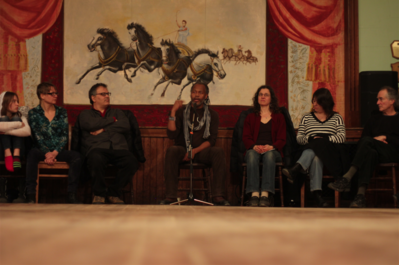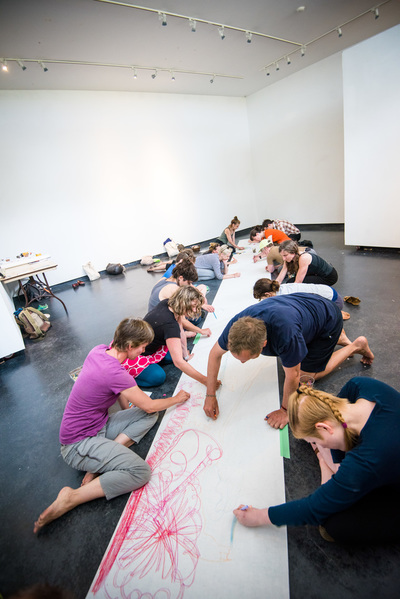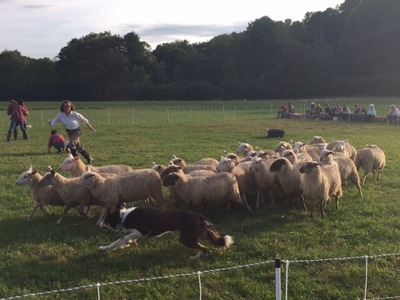Navigating the Election Part 3: Sara Coffey

Community Shout with Reggie Wilson Fist and Heel Performance. Photo: Luke Stafford
By Olivia J. Kiers
Sara Coffey is the founding director of Vermont Performance Lab (VPL), a “performance incubator” located near Guilford in rural southeastern Vermont. VPL is known for fostering community engagement as well as giving performance artists the tools they need to create and collaborate, resulting in events like an upcoming tent and blanket drive with Groundworks Collaborative on March 8 to accompany a residency exploring the subject of homelessness and immigration (In the Works: Material Deviance In Contemporary American Culture by Alice Gosti).
Coffey is the third voice in Art New England’s series of interviews on New England artists’ perspectives in the wake of the 2016 presidential election, following conversations with activist Mason Dunn and painter Janette Maxey.
Art New England: What instigated the Vermont Performance Lab’s creation in 2006, and has the recent election changed the way you think about VPL’s mission at all?
Sara Coffey: The results of the recent election were disturbing in so many ways, but it made us feel more committed to our work… I believe it’s at times like this when artists really go to work.
When I first started Vermont Performance Lab, it was informed by a number of things. One was that artists working in the collaborative performing arts had fewer places to develop work than, say, visual artists or writers. They need a different set of circumstances because of the nature of collaboration. Often, artist residencies are all about giving artists space… What makes us different is that we create situations where artists listen to our community here in Vermont, and the community can rub off on the artist and their process.
We plan most of our projects pretty far out, so some of the work scheduled for this spring was already in place [before the election]. This spring, artists in our lab are visiting an area undergraduate class on the topic of dance and social practice. The themes in their work are mass incarceration, homelessness and immigration in material culture, black masculinity in the United States from Afro-Caribbean and African-American perspectives, and certain environmental concerns. Also, in June we’re presenting a work that has a lot to do with queer history sandwiched between the Summer of Love and the arrival of AIDS. As you can see, social concerns are already in our DNA.
We did do a call this December—post-election—for our SEED program, which is designed specifically for artists living within a 60-mile radius of our lab. We’re excited with the response from local artists who are using a post-election lens.

Jennifer Monson, iLANDing workshop. Courtesy Vermont Performance Lab.
ANE: Are there any lessons you learned through VPL that would be useful to artists who are now beginning to engage in political or activism-based projects?
SC: One of the best strategies is listening to your community and asking questions before taking action… When you establish some trust and prove that you are listening, then you can make things happen in a very exciting way. Acting without listening (because you assume you know what’s right) can be very patronizing. I think the results of this election came in part from people not being listened to, and feeling ignored or left out. We need to pay attention…
The other thing that I find really important is participating within my community in the civic realm, in ways that are not just art-based. Artists and activists can often swoop in with a project, and then leave. That questions the impact of their art—does the work feel like a drive-by?
I’m all in for slow, long-term change. That’s the way we try to operate the lab, with extended residencies if possible. We also repeat artists over time to build relationships between them and local residents. Everyone wants change to happen quickly, but taking a long view is helpful.
ANE: Recently there have been many calls for protest, but also calls for unity. Which course of action resonates most from your perspective?
SC: Both resonate and I think they are compatible, though they sound disparate. Protest is speaking up about transgression, or for protection and equality. What guides my practice at VPL more is finding ways for unity without smoothing over the differences… but both are healthy in a democracy.

Ann Carlson, Doggie Hamlet, performed September 2016. Photo: Sara Coffey
ANE: Is there anything I haven’t asked you, that you feel is important for artists to think about in this current political climate?
SC: I have a very rural perspective because of where we are located. There’s a kind of specificity about rural America—both the beauty of it and the poverty of it. There are plenty of social and economic issues that concern rural communities, that are similar to yet distinct from issues in urban communities. My plea would be for fewer assumptions and generalizations about what “rural” means. And, there’s a lot of wisdom inherent in these small communities that deserves to be heard.
To learn more about the Vermont Performance Lab and discover upcoming events, please visit the website.
